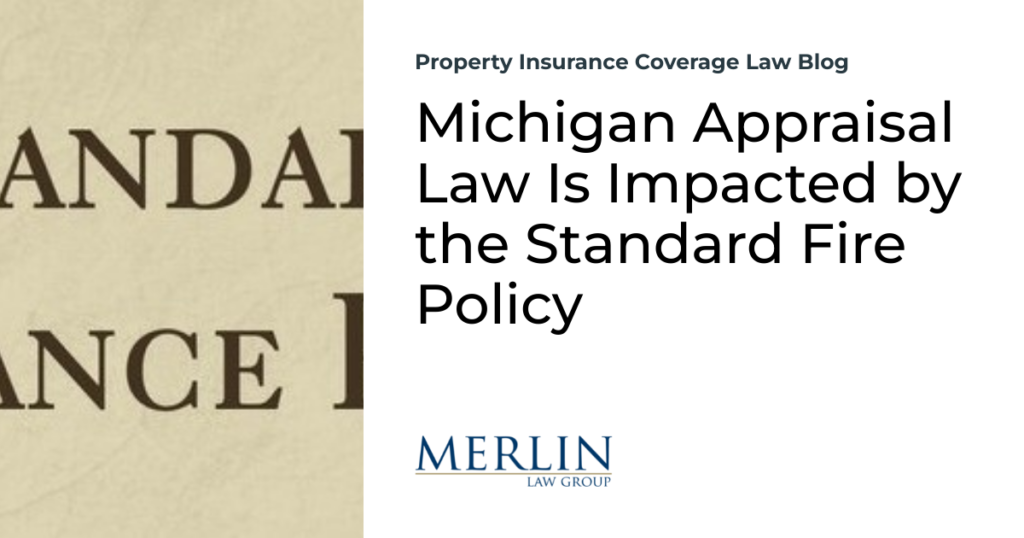Michigan Appraisal Law Is Impacted by the Standard Fire Policy

This morning’s post, Chip Merlin to Speak About the Hottest Topics and Fastest Trends Regarding Appraisal of Property Insurance Claims Next Monday Afternoon in the Motor City, may leave some readers wondering about Michigan insurance law regarding appraisal. A quick search of this blog shows It has been a decade since we posted, Michigan Court, Inspired by Florida Case, Rules in Favor of Policyholder and Approves Public Adjuster in Appraisal Matter, Part II, on Michigan insurance appraisals.
A relevant update on Michigan insurance appraisal involves a federal case with State Farm and Michigan’s standard fire policy.1 The court was concerned with State Farm’s policy language regarding appraisal, which differed from the statutory language in Michigan’s standard fire insurance policy. On this point, the court held that State Farm’s policy provisions have to give way to Michigan’s statutory policy provisions:
With One Exception, the Appraisal Provisions Cited by Plaintiffs are Contrary to MCL 500.2833(1)(m) and Void as Against Public Policy
As set forth below, with one exception, the provisions in Policy Form HW-2122 cited by Plaintiffs make the appraisal process far more burdensome than the Michigan Legislature intended. As such, they are contrary to MCL 500.2833(1) (m) and void as against public policy.
Interestingly, the decision confirmed that under the standard fire policy in Michigan, appraisers can be retained on a contingent fee agreement:
Under MCL 500.2833(1)(m), ‘the independent appraiser may be biased toward the party who hires and pays him, as long as he retains the ability to base his recommendation on his own judgment.’… An appraiser is not disqualified for having ‘previously served as [an] adjuster[ ].’ Nor is an appraiser disqualified for having some financial interest in the outcome of the appraisal process. See White v. State Farm & Cas. Co., 293 Mich. App. 419, 809 N.W.2d 637 (2011) (noting that ‘appraisers in Michigan are not considered to be quasi-judges’ and ‘hold[ing] that a contingency-fee agreement does not prevent an appraiser from being ‘independent’ under MCL 500.2833(1)(m)’). Accordingly, as applied to appraises, the above restrictions in Policy Form HW-2122 are contrary to MCL 500.2833(1)(m) and void.
This case will obviously be discussed in greater detail next Monday and Tuesday at the IAUA event. I hope to see you there.
It is significant to note that State Farm now has a specialized claims department dealing with appraisals. If you are involved in a State Farm appraisal, you need to read State Farm Operation Guide Regarding Appraisal. Another relevant post regarding State Farm’s appraisal methodology is Why Has State Farm Stopped Paying Appraisal Awards.
Afternoon Thought About Michigan
Everything I’ve done in my career has started in and around Detroit, you know, the metro area and Michigan.
—Kid Rock
1 Hart v. State Farm Fire & Cas. Co., 556 F.Supp.3d 735 (E.D. Mich. 2021).







